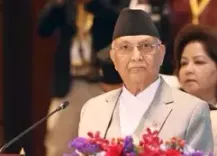Is Anubhav Sinha Questioning the Hindi Film Industry’s Recipe for Success?

Synopsis
Key Takeaways
- Filmmaker Anubhav Sinha critiques the Bollywood industry's approach to filmmaking.
- He emphasizes the importance of focused storytelling in films.
- His analogy of food illustrates audience expectations in cinema.
- Sinha encourages viewers to embrace films that challenge traditional narratives.
- There’s a call for audiences to reflect on their choices when selecting films.
Mumbai, Sep 9 (NationPress) Filmmaker Anubhav Sinha, renowned for films like ‘Mulk’, ‘Thappad’, and ‘Bheed’, is contemplating the intricacies of the film industry.
On Monday, he shared a video on Instagram where he spoke directly to his audience. He drew intriguing comparisons between cinema, culinary experiences, and literature.
He expressed, “I was reflecting on how, when we decide to dine out with friends and family, numerous opinions emerge – ‘Let’s have Punjabi cuisine, let’s indulge in Mughlai dishes. No, let’s opt for something less spicy today, perhaps Italian.’ Regardless of what cuisine we eventually select, we don’t yearn for the others. If we choose a milder dish, we stick to that flavor. We don’t dwell on alternatives because we made that choice.”
He further elaborated that this concept applies to literature as well. He stated, “If you choose to read the poems of Dinkar, you will find his verses. You won’t discover Shakespeare’s works within that selection. So why do we expect this in films? Is it a misconception? If so, please enlighten me. We have faith in Hindi films that they should encompass everything, much like how every spice blends into the gravy of our meals, creating a harmonious taste. So, why do films deviate from this? You decide, ‘I’m watching this film to enjoy, not to ponder deeply. Let’s just have a good laugh today.’”
He continued, “Or you might select a film simply for its star. When your favorite actor appears in slow motion, it’s thrilling. That star can perform actions that stray from the plot, but it’s enjoyable because you admire the star.”
He acknowledged that some films spark discussions and critiques about societal issues.
He remarked, “When I prepare to view these thought-provoking films, I often hear in Bollywood that they must include songs, humor, and plenty of drama. They need to be somewhat loud. When you attend such a film, are you mentally prepared for a less flavorful experience? It might even challenge you with uncomfortable questions about our own behaviors, which we often avoid.”
“There are moments when facing the truth can be uncomfortable. So, are we ready to sit through a film that lacks entertainment value, focusing instead on criticism and dialogue? Or perhaps I am mistaken. I don’t have a definitive answer, so I’m eager to hear your thoughts,” he concluded.









